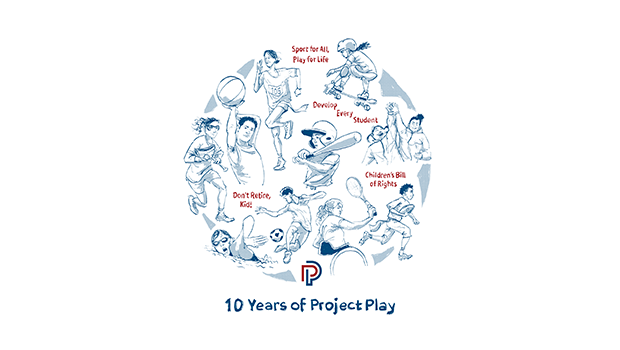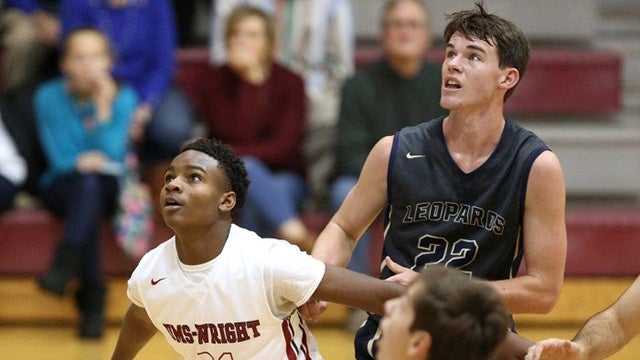The clock is ticking on what the future of college sports will look like. The NCAA went to Congress last year seeking help to pass federal legislation that would give athletes the right to market their name, image and likeness (NIL). The idea is to create a uniform policy rather than a state-by-state framework, which could start July 1 when is set to begin.
“Now we have leverage because (colleges) are facing a threat to their revenue model,” U.S. Sen. Cory Booker said at the Aspen Institute’s Future of Sports conversation event on Feb. 19. “It gives me a chance in my position in the Senate, along with a lot of great Senate partners, to say we are not going to settle these issues unless you make a commitment to the health and safety of our athletes.”
Last December, Booker helped introduce the College Athletes Bill of Rights – one of five bills linked to athlete pay that have been proposed by Congress over the past year. Some proposals from Democrats, such as Booker’s, are expansive beyond NIL and include medical trust funds, enforceable health and safety standards, revenue sharing between athletes and universities, and a congressional commission with subpoena power. Other bills proposed from Republicans are more restrictive and provide legal protections to the NCAA against future lawsuits.
No one in college sports knows exactly where this is headed given so many moving parts. Congress is now barely controlled by Democrats, the Supreme Court in March will hear historic arguments on a college athlete compensation lawsuit, and the Florida NIL deadline looms as other states may push up their start date to stay competitive on the field.
“Don’t underestimate our ability to take all the time that we have until the final hours of a deadline,” said Booker, who thinks Congress won’t start moving on a bill until the spring or summer given the nation’s focus on vaccinations and the economy.
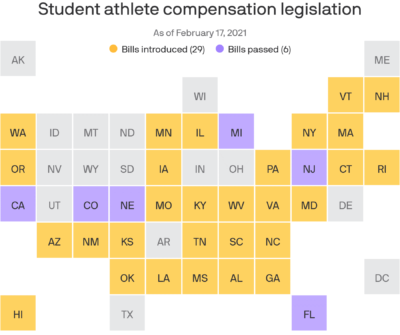
Source: Axios
Said Congresswoman Lori Trahan (MA-D), who joined recently with Sen. Chris Murphy to introduce the College Athlete Economic Freedom Act: “Sen. Booker is right that these things can move when there’s a deadline looming. … We’re going to be pressing for this because of the summer deadlines and we’ll work to make sure NIL is put into law so that we can always improve the value proposition of student-athletes.”
Given the new 50-50 split in the Senate, with Vice President Kamala Harris holding the deciding vote, every senator has even more power than usual. Booker acknowledged that revenue sharing will be difficult to pass and he believes there’s more appetite in Congress to expand the value of the scholarship.
“I am telling folks right now that I will not let a lot of these money issues be settled until the safety of college athletes, their well-being, and their education are addressed,” Booker said. “We’ve had some preliminary negotiations already. I think a lot of these basic health and safety things are going to be part of whatever change is made to NIL.”
What would the impact be on college sports and its participants assuming college athletes are allowed to be paid? Here are some highlights from our Future of Sports conversation.
Non-revenue sports and women’s sports
Booker: “This idea that an industry that generates $15 billion does not have the resources to give some kind of more fair compensation to the athletes that are actually creating that wealth, to me, it’s just not confronting the realities of dollars and cents. The thought that the water polo team would have to be thrown overboard (and get cut) by a university that spends millions and millions of dollars just on coaching salaries – you’ve lost your sense of priorities as a university if that’s the equation you’re making.”
Trahan: “We believe (NIL) will benefit women’s sports at all levels. Apart from the opportunities like the WNBA Draft or Olympics, there generally isn’t a lot for women athletes after college. … With all the harm the Internet culture can do, especially to warping young women’s self-image, I think NIL (through social media influencers) seems like a way to restore some degree of choice, control, fairness and positive role models.”
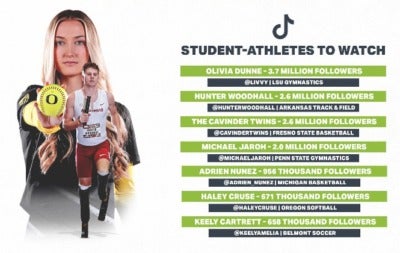
Source: Opendorse
Blake Lawrence, Opendorse CEO/former Nebraska football player: “If you say who’s going to generate the most revenue in NIL in the first year, the first who come to mind are the Cavinder twins (women’s basketball players at Fresno State). … We did an analysis back in September before they started the season and estimated they could earn $326,000 a year through social media promotions. They have 2 million followers on TikTok and 50,000+ subscribers on YouTube. We checked in after the season started. Their value had risen to $527,000. You’re talking about two female sophomores in the Mountain West Conference who could be making half a million dollars in the first year of NIL simply because of the online presence they’ve developed. …. These athletes won’t all be breaking the bank. But think back to your college days. If you had an extra $20 per week in your pocket, that would change your life.”
Competitive balance
Tony Franklin, recently retired longtime college football coach: “In my opinion, this is the new frontier, which equalizes everything. You’re going to take some programs that right now are at a disadvantage facility-wise and at a disadvantage money-wise from a booster standpoint, and now you’ll have some universities that become extremely creative, put together an amazing plan and all of a sudden there may be a non-Power Five school that rises to prominence because of creative social media marketing name and likeness ideas. … I could see Nebraska coming back to the top 10 (in football) because of the fans out there. The worst thing that could happen is the NCAA trying to get involved and creating a gigantic new set of rules.”
Lawrence: “These athletic departments are now in a position, in order to stay competitive, they’re going to make major investments in developing (through NIL opportunities) a life skill for every student-athlete. When I was at Nebraska, we went to a seminar and it was about why you should not use Facebook, why you should not use Twitter. It was all scare tactics. Because in 2008 and 2009, none of us should have been using Facebook the way we were. It’s now the opposite. Can you imagine in today’s society if every student-athlete left college knowing that what you do and say online leaves a tremendous impact on the rest of your life?”
Franklin: “There are two types of coaches – those that are used to doing things the same way, and they’re going to moan and groan and fight (NIL) and say kids aren’t the way they used to be, and creative ones. I believe there’s a new breed of coach out there right now looking at this going, ‘Wow, this is going to make our program so much better and this is going to make the opportunity for young people so much better.”
Trickle-down effect on high school/youth sports
Booker: “At Stanford, I was there during the dot-com boom and I’m seeing guys in their dorm rooms starting businesses and profiting off their particular genius. Why do we create a different standard for some genius high school student that has other things they can market that’s not sports, but suddenly if you’re a football or basketball player and have another type of particular genius, oh my gosh, we’re all suddenly worried about you making money? I just don’t get it.”
Fan experience
Franklin: “It’s fickle already. If you throw an interception, whether you make $10,000 or not won’t make a difference how much (fans) hate them. … I see no negative in this. I see only positives in this for the student-athlete.”
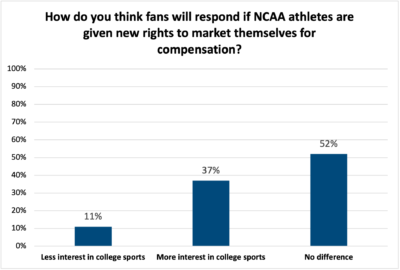
In an unscientific survey by the Aspen Institute of approximately 600 Future of Sports attendees, 89% said allowing athletes to market themselves will increase fan interest or make no difference to fans.
Lawrence: “There are fan bases that have moaned and groaned (in the current NCAA amateurism model) about whispers of money in McDonald’s bags to get a recruit to go to a certain school. … Now there’s an opportunity for the most intelligent fan bases to say, ‘When our athletes are promoting products online, signing autographs at the union and putting on camps and clinics, we show up and we show up in a big way because we want to support our athletes directly. … It may help change the recruiting tides in those programs that are very passionate about student-athlete support. … I do believe there needs to be visibility of the sources of transactions to make sure this doesn’t go into a pay-for-play scheme (in which boosters pay exorbitant amounts of money to players for minimal endorsement work in order for recruits to sign with a school).”
Booker on whether fans will stop watching if athletes are paid: “Come on. We have heard this before. Doesn’t this sound very similar to the arguments made against Olympic athletes being able to benefit from their name, image and likeness? I’ve heard these before in my lifetime on how this undermines amateur competition. We can make rules that protect and affirm the safety, security, education and financial well-being of college athletes and still have the best competition that we all enjoy. The problem with the NCAA is it often does not move until it has to. If things go south (with creating a uniform NIL policy), it will be the NCAA’s fault because they were unwilling to compromise on things to benefit their athletes.”
Jon Solomon is editorial director of the Aspen Institute Sports & Society Program. Watch past events from the Future of Sports conversation series.
